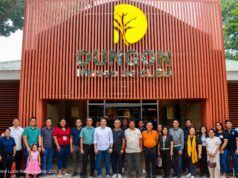All core businesses recorded double-digit growth
MANILA, Philippines — Andrew Tan-led property giant Megaworld Corporation, registered a net income of P19.3–billion in 2019, up 22% compared to P15.8-billion the previous year. Excluding non-recurring gains of P691–million, net income grew 18% to a new record high of P18.6–billion. Net income attributable to parent company stood at P17.9–billion, also up 18% from P15.2–billion the year before.
Consolidated revenues grew at a robust pace of 17% to P67.3-billion in 2019 from P57.4-billion in 2018. The healthy growth was underpinned by the strong performances of all of its key businesses.
Megaworld’s rental business posted another record growth last year, soaring 18% to P16.8-bilion from P14.3-billion in 2018.
Its office leasing arm, Megaworld Premier Offices, primarily contributed to the record growth in rentals, soaring 20.5% to P10.5-billion from P8.7-billion the previous year. The company was able to complete around 192,300 square meters of new leasable office spaces last year. This has brought Megaworld Premier Offices’ current inventory of leasable office spaces to 1.3-million square meters.
“Undoubtedly, our strongest rental business still comes from our leases of prime office spaces across the Philippines. This excludes the office spaces that we have already sold and are currently selling. The good news is that we still continue to see growth in the business process outsourcing (BPO) and information technology (IT) sectors, which comprise majority of our office rentals to date. Also, I would like to point out the growth in the demand for office spaces outside of Metro Manila, in which we are in the best position to provide to space seekers because of our adequate office inventory in the provinces including those that are still in our pipeline,” says Kevin L. Tan, chief strategy officer, Megaworld.
Megaworld is continuously building more office towers, primarily to cater to the growing BPO sector, in Iloilo, Bacolod, Davao, Cebu, Cavite, Laguna, and Pampanga. In Metro Manila, the company is also building additional office developments in its various townships such as McKinley West and Uptown Bonifacio in Taguig, and Arcovia City in Pasig City.
“This remains to be a very strong sector and very sustainable, and even with the emergence of Artificial Intelligence (AI), we will also see the emergence of new companies that would require spaces,” adds Tan.
Megaworld Lifestyle Malls, on the other hand, grew its income by 14% to P6.3-billion from P5.5-billion in 2018. Around 20,600 square meters of leasable spaces were added to the company’s retail space portfolio, bringing the total leasable space to 453,000 square meters.
The company’s real estate sales in 2019 grew 12%, ending the year at P42.6-billion from P38.0-billion during the previous year. Last year, Megaworld also registered a record level sales reservation amounting to P149-billion. It also launched around P85-billion worth of new projects, mostly residential, and two new office projects for sale: the One Corporate Place in Maple Grove, Cavite; and the International Corporate Plaza in Iloilo Business Park, Iloilo City.
Last year, Megaworld launched its 26th township, the Arden Botanical Estate located at the boundary of Trece Martires City and Tanza in Cavite, spanning across 251 hectares of raw land. Along with its subsidiary, Empire-East Land Holdings, Inc., it also launched the 24-hectare Empire East Highland City in Cainta, Rizal.
Meanwhile, the company’s hotel business under the Megaworld Hotels brand also registered phenomenal growth as hotel revenues soared 67% to P2.5-billion compared to previousyear’s P1.5-billion. This after the company opened three new hotel properties: 93-room Hotel Lucky Chinatown in Binondo, Manila; 442-room Belmont Hotel Boracay in Boracay Newcoast, Aklan, and the 547-room Savoy Hotel Mactan in Mactan Newtown, Cebu.
“Megaworld still has the lowest financial gearing among the major listed property companies. We ended 2019 with a net debt-to-equity ratio of 26%, even lower than its 2018 level of 31% as gross debts stood unchanged during the year. This should give us more elbow room to lever up once the situation improves, likely by next year,” adds Tan.
During the last 30 years, the company was successful in master-planning integrated urban townships, integrated lifestyle communities and lifestyle estates across the country that include: Eastwood City in Libis, Quezon City, (18.5 hectares); Newport City in Pasay City (25 hectares); McKinley Hill (50 hectares), McKinley West (34.5 hectares), Uptown Bonifacio (15.4 hectares) and Forbes Town (5 hectares), all in Fort Bonifacio, Taguig City; The Mactan Newtown in Lapu-Lapu City, Cebu (30 hectares); Iloilo Business Park in Mandurriao, Iloilo City (72 hectares); Sta. Barbara Heights in Sta. Barbara, Iloilo (173 hectares); Boracay Newcoast in Boracay Island (150 hectares); Twin Lakes in Laurel, Batangas near Tagaytay (1,200 hectares); ArcoVia City in Pasig City (12.3 hectares); Southwoods City in the boundaries of Cavite and Laguna (561 hectares); Davao Park District in Lanang, Davao City (11 hectares); Alabang West in Las Piñas City (62 hectares); Eastland Heights in Antipolo, Rizal (640 hectares); Suntrust Ecotown in Tanza, Cavite (350 hectares); Maple Grove in General Trias, Cavite (140 hectares); The Hamptons Caliraya in Lumban-Cavinti, Laguna (300 hectares); The Upper East (34 hectares) in Bacolod City, Northill Gateway (50 hectares) in Bacolod-Talisay, Negros Occidental; Capital Town Pampanga beside the Pampanga Provincial Capitol in the City of San Fernando (35.6-hectares); Westside City within the Entertainment City in Parañaque City (31 hectares); Empire East Highland City in Cainta, Rizal (24 hectares); Arden Botanical Estate at the boundary of Trece Martires City and Tanza, Cavite (251 hectares); and Lucky Chinatown in Binondo, Manila (5 hectares).





